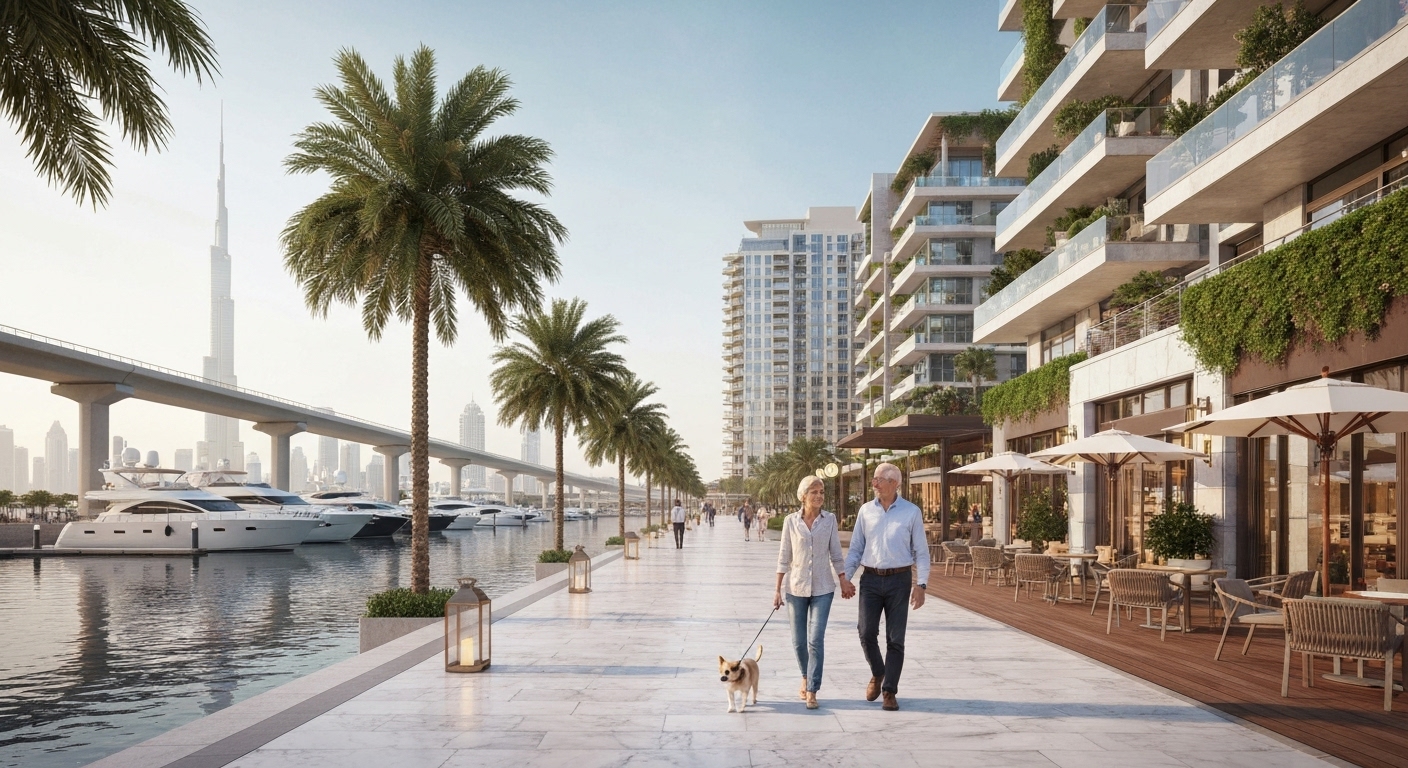Retiring in Dubai pros and cons of buying property vs renting is a key question for expatriates and high-net-worth individuals evaluating their long-term future in the UAE. This article breaks down the financial, lifestyle, and practical implications of both options—using local insights and authoritative sources—to empower you to make an informed decision for your retirement in Dubai.
Why Dubai is an Attractive Retirement Destination
Dubai is increasingly popular among retirees due to its world-class infrastructure, cosmopolitan atmosphere, and high standard of living. The emirate is home to iconic neighbourhoods such as Dubai Marina, Downtown Dubai, and Jumeirah, where retirees benefit from proximity to luxury amenities, extensive healthcare facilities, and vibrant leisure options. Compared to global alternatives, Dubai offers a transparent real estate market, strong economic growth, and investor-friendly policies that support long-term planning and wealth preservation. Its safety, tax advantages—such as no personal income tax and no property tax for most residential properties—and exceptional connectivity make it an ideal choice for those seeking an international retirement hub.
Buying Property in Dubai for Retirement: Advantages and Disadvantages
Purchasing property in Dubai brings notable advantages for retirees planning to settle in the city long-term. First, the current real estate environment offers high return on investment and steady capital appreciation, making purchasing a robust wealth-building strategy. Unlike many international markets, Dubai features relatively low property acquisition costs, flexible payment plans, and strong rental yields. For those intending to stay for many years, buying can be more economical than renting and provides stability as well as the potential to leave a legacy asset for family or heirs.
However, buying also comes with its challenges. Upfront costs—including deposits (often 20-25% of the property value), registration fees, and maintenance charges—can be substantial. The market is dynamic, so those seeking short-term residence or preferring a flexible lifestyle may find ownership less appealing. Selling a property can take time, and there’s always an element of market risk involved.
Renting Property in Dubai for Retirement: Advantages and Disadvantages
Renting property for retirement in Dubai offers flexibility—a crucial consideration for those uncertain about the length of their stay or who wish to experience different communities before settling down. Renting eliminates the need for significant upfront investment, allowing retirees to allocate resources elsewhere or maintain greater liquidity. Lease agreements typically range from one to three years and allow easy relocation if needs change, or if retirees wish to downsize as they age.
On the downside, long-term renters never gain equity or benefit from market appreciation. Over the years, rental payments may surpass the total cost of buying, especially given Dubai’s tendency for annual rent increases and the absence of rent control. Additionally, some rental contracts include restrictions on modifications or pets, and retirees may face periodic renegotiation of lease terms.
Key Financial Considerations for Retirees: Buying vs. Renting
For prospective retirees, the decision to buy or rent in Dubai is deeply influenced by financial planning and expected length of stay. Buying property can be more cost-effective for those planning to live in the UAE for a decade or more, as it shields against rising rents and channels monthly outflows into a valuable asset. Investors benefit from Dubai’s high capital appreciation and excellent rental yields, especially in sought-after developments.
Renting, meanwhile, is often advisable for individuals who desire maximum freedom, have a shorter planning horizon, or wish to test several lifestyles and locations before committing. The lack of ownership responsibilities (e.g., maintenance, service charges) and easier exit options can appeal to retirees who value hassle-free living.
Example: Comparing a 10-Year Horizon
Suppose a retiree expects to live in Dubai for at least ten years. Purchasing a home in a popular neighbourhood might involve significant upfront expenses, but results in long-term savings and asset growth compared to equivalent rental payments. Conversely, short-term residents or those wary of market risks might be better off renting despite potential escalation in rents.
Visa and Residency Benefits Related to Property Ownership for Retirees
One of the most significant advantages of owning property in Dubai is eligibility for long-term residency visas. Property investors can typically qualify for renewable residence permits, including the five- and ten-year Golden Visa programs. This provides certainty and peace of mind, making it easier to access healthcare, banking, and other resident-only services. By contrast, most standard rental agreements do not offer a path to comparable residency status.
Lifestyle and Long-Term Planning: Making the Right Choice for Your Retirement
Lifestyle goals play a pivotal role in determining whether to buy or rent. Those seeking stability, investment growth, and a permanent base may find homeownership aligns with their vision. Retirees who favour adaptability or anticipate changes—such as moving closer to family or health services—may prefer the flexibility of rental arrangements. Both options are supported by Dubai’s mature infrastructure, but the nuances of each—ranging from community ties to healthcare proximity—should be weighed carefully.
Expert Advice: Navigating Property Decisions with Danube Properties
Deciding between buying and renting property in Dubai for retirement is complex and personal. Each retiree’s financial objectives, desired flexibility, and lifestyle expectations matter. For further guidance tailored to your circumstances, contact Danube Properties to learn more.




